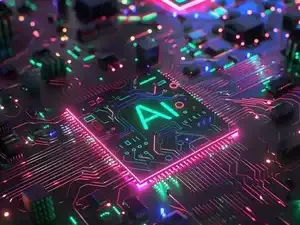There is only one qualified engineer available for every 10 open Generative AI roles in India, underscoring a severe talent shortage in the country's fast-expanding digital economy, according to specialist staffing firm TeamLease Digital.
To make matters worse, the AI talent gap could widen to 53% by 2026, potentially constraining enterprise ambitions unless large-scale skilling initiatives are implemented, the firm said in its Digital Skills & Salary Primer 2025-26 report. The report is based on an analysis of 30,000 salaries across various technology job roles, skills, and functions, categorised by experience level, location, and industry sectors.
India's AI market, projected to touch $28.8 billion by this year-end, growing at 45% compounded annually, has become central to enterprise value creation. Yet the imbalance between demand and supply is stark.
Cloud computing, another key growth driver, is expected to face a 55-60% demand-supply mismatch in the next two years. "India's digital economy is at a pivotal juncture, with AI, Cloud, and Cybersecurity redefining the future of work," said Neeti Sharma, chief executive at TeamLease Digital.
Global Capability Centres (GCCs) are emerging as the biggest drivers of this digital hiring wave. They are projected to contribute over 22-25% of net new white-collar tech jobs in 2025, led by AI and cloud roles. Of the 4.7 million new tech jobs expected by 2027, more than 1.2 million will come from GCCs, particularly in GenAI and engineering R&D roles.
GCC hiring is also spreading beyond metros to Tier-2 and 3 engineering campuses, with 130,000-140,000 fresh graduates expected to have been hired in FY25.

Women currently comprise 40% of the workforce in the top 20 GCCs, 1.5 times the industry average. "The rise of GCCs from 2.16 million professionals today to 3 million by 2030, combined with diversity-first hiring, is accelerating innovation at an unprecedented pace," Sharma said.
The severe supply-demand mismatch is causing a sharp rise in salaries in frontier tech roles.
Within GCCs, GenAI engineering, and Machine Learning operations or MLOps are setting new pay benchmarks, with year-on-year hikes above 18%.
"Generative AI Engineering and MLOps professionals are commanding premium salaries of ₹58-60 LPA (lakh per annum) for senior talent," said Sharma, adding that GCCs alone account for 30-35% of AI hiring nationwide.
Cybersecurity and data engineering roles remain foundational, with average salaries projected to rise from ₹28 lakh to ₹33.5 lakh, and from ₹23 lakh to ₹27 lakh, respectively, between FY25 and FY27. Of this, senior cybersecurity professionals can command up to ₹55 lakh, while their data engineering counterparts can get up to ₹42 lakh annually.
Cloud Computing salaries are also on the upswing, with senior Cloud Architects earning up to ₹45 lakh annually.
Outside GCCs, India's IT products and services sector is undergoing its own transformation. Hiring in the sector is projected to grow 11% in FY26, with more than 150,000 fresher positions expected.
Product management is emerging as the fastest-growing skillset, with senior salaries set to rise by 29% to ₹42 lakh by FY27, while Cloud Computing salaries are forecast to grow nearly 20% over the same period. GenAI roles, though expanding steadily, are growing at a slower clip, with senior salaries moving from ₹28 lakh to ₹33.5 lakh by FY27.
Digital acceleration is also reshaping traditionally non-tech industries such as BFSI, manufacturing, retail, and healthcare. These sectors are recruiting heavily for AI, cloud, and cybersecurity talent while phasing out legacy roles.
However, IT support and legacy systems maintenance salaries have stagnated at around ₹12 lakh annually, reflecting the shift towards cloud-native and outsourced service models.
To make matters worse, the AI talent gap could widen to 53% by 2026, potentially constraining enterprise ambitions unless large-scale skilling initiatives are implemented, the firm said in its Digital Skills & Salary Primer 2025-26 report. The report is based on an analysis of 30,000 salaries across various technology job roles, skills, and functions, categorised by experience level, location, and industry sectors.
India's AI market, projected to touch $28.8 billion by this year-end, growing at 45% compounded annually, has become central to enterprise value creation. Yet the imbalance between demand and supply is stark.
Cloud computing, another key growth driver, is expected to face a 55-60% demand-supply mismatch in the next two years. "India's digital economy is at a pivotal juncture, with AI, Cloud, and Cybersecurity redefining the future of work," said Neeti Sharma, chief executive at TeamLease Digital.
Global Capability Centres (GCCs) are emerging as the biggest drivers of this digital hiring wave. They are projected to contribute over 22-25% of net new white-collar tech jobs in 2025, led by AI and cloud roles. Of the 4.7 million new tech jobs expected by 2027, more than 1.2 million will come from GCCs, particularly in GenAI and engineering R&D roles.
GCC hiring is also spreading beyond metros to Tier-2 and 3 engineering campuses, with 130,000-140,000 fresh graduates expected to have been hired in FY25.

Women currently comprise 40% of the workforce in the top 20 GCCs, 1.5 times the industry average. "The rise of GCCs from 2.16 million professionals today to 3 million by 2030, combined with diversity-first hiring, is accelerating innovation at an unprecedented pace," Sharma said.
The severe supply-demand mismatch is causing a sharp rise in salaries in frontier tech roles.
Within GCCs, GenAI engineering, and Machine Learning operations or MLOps are setting new pay benchmarks, with year-on-year hikes above 18%.
"Generative AI Engineering and MLOps professionals are commanding premium salaries of ₹58-60 LPA (lakh per annum) for senior talent," said Sharma, adding that GCCs alone account for 30-35% of AI hiring nationwide.
Cybersecurity and data engineering roles remain foundational, with average salaries projected to rise from ₹28 lakh to ₹33.5 lakh, and from ₹23 lakh to ₹27 lakh, respectively, between FY25 and FY27. Of this, senior cybersecurity professionals can command up to ₹55 lakh, while their data engineering counterparts can get up to ₹42 lakh annually.
Cloud Computing salaries are also on the upswing, with senior Cloud Architects earning up to ₹45 lakh annually.
Outside GCCs, India's IT products and services sector is undergoing its own transformation. Hiring in the sector is projected to grow 11% in FY26, with more than 150,000 fresher positions expected.
Product management is emerging as the fastest-growing skillset, with senior salaries set to rise by 29% to ₹42 lakh by FY27, while Cloud Computing salaries are forecast to grow nearly 20% over the same period. GenAI roles, though expanding steadily, are growing at a slower clip, with senior salaries moving from ₹28 lakh to ₹33.5 lakh by FY27.
Digital acceleration is also reshaping traditionally non-tech industries such as BFSI, manufacturing, retail, and healthcare. These sectors are recruiting heavily for AI, cloud, and cybersecurity talent while phasing out legacy roles.
However, IT support and legacy systems maintenance salaries have stagnated at around ₹12 lakh annually, reflecting the shift towards cloud-native and outsourced service models.








